The Story about Anna and Stephen Sťahel, who saved Henry Lövinger, Mr. Šimkovic and Bubi Roth in a village called Cabaj Čápor.
Anna and Stephen Sťahel
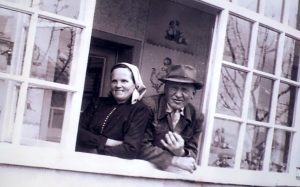
After their wedding, Anna and Stephen Sťahel lived in Stefan’s parents house in Cabaj-Čapore. They had four children, but after the first three were born ( Jaroslav in 1935, Erika in 1937, Vladimir in 1940), they decided to build a house. On Christmas day 1949, their daughter Eva was born, today her name is Mrs Kollárova, and she remembers her parents and grandparents with lots of love. She came into the family in the new house, where the Sťahel family moved after the war. On the table in the new house was the Christmas dinner, which they quickly packed into the tablecloth and only her mother Anna and the midwife stayed behind in the house. The family waited in the old house, which they all lived in during the war, for news about the birth of the last daughter and granddaughter. The War had finished in 1945.
Old house
During the war, Anna and Stephen lived in Stephen Sťahel‘s parent‘s house, with their children Jaaroslav, Erika and Vladimir. It was a typical countryside house, with a front , middle and back room and was a home for 7 people. In the back there was one more room called ‘ żombora’ , it was a room where there was a dish with fat, butter and everything else belonged to the storage room. The family spent most of the time in the front room. Visitors sitting at the table. They cooked in the back room, where they would eat food at the big table and wooden bench. In the room there was a stand on which the grandparents of Eva Kollárová had a statue of the Virgin Mary. The young married Sťahel couple slept with their children in the front room. Eva’s grandparents slept in the middle room. ‘ Bread is a gift from God and the table must be clean” Eva remembers her grandmother saying. “Grandmother always cleaned the table”. Bread was always covered and before they cut it, they made a cross on it. ” When my grandmother prayed she always looked at the Virgin Mary and crossed herself, grandad would have one shot of some alcohol”
The Sťahel family were very hard-working. They had land, cows and a horse.
Stephen bought machinery to plant seeds, and helped people in the village. When he earnt some extra money, they would buy more land. In their backyard there were also some buildings for animals.
War
Despite the war going on, village life had to continue. People looked after their fields, animals and were growing different produce. They did what they could so they had enough food. ” Life has to continue, despite what could happen to anyone, or somebody could be killed when there was an air raid, and you were on the road or on the field and you had nowhere to hide”, Eva remembers her mother’s words. One day when people were leaving the church, there was a big air raid and the village was bombed. Girls died that time. In the village there were lots of soldiers. Germans and Russians, and until the fight came you had to be very careful. For Eva’s mum especially, it was a very difficult time, ” you did not know what, and how people would react,” explained Eva, ” she was constantly scared,” and she had a reason why…
1944
One evening when the children of the Sťahel family were 9, 7 and 4 years old, somebody knocked on the door. Stephen opened it. Behind the door were three young men and they begged him to let them hide in the house. Stephen didn’t decide on his own. He called his wife and she came with 3 little children behind her skirt. Now she had to decide…
Mum very often remembered what went through her mind, ” If we don’t hide them and something happens to them, we will find out, how will we live with it for the rest of our lives? If we hide them and they are found, or somebody reports us, all our family will die”. They couldn’t just sit down and think about that, they had to act immediately.
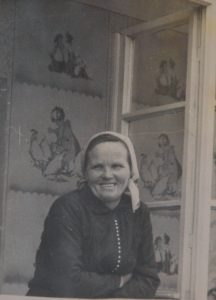
“If we don’t hide them,
and something happens to them we will find out,
and how are will we live with it for the rest of our lives?
If we hide them and they are found,
or somebody reports us,
all our family will die…”
Three young men walked into our house. That night they slept in the Sťahel family house. They squeezed everyone in. The family slept in one room, seven of them and three men in the second room: Henry Lövinger, Mr Budi and Mr Šimkovic.
Safer place
The 3 men couldn’t stay longer in the house than one night. On the second day, the Sťahel family moved them and hid them in the hay, in the place called ‘hajloch’ it was in the vineyard, where they stored hay. The vineyard was behind the village. They left them there one day with some food, but then they realised that if they go there often to work on the vineyard, which is already finished, it could be very suspicious. After one night, they decided that they would hide them in the house they were building. This was a good place. They were finishing the house during the winter, so even if they went there and carried food it was not unusual.
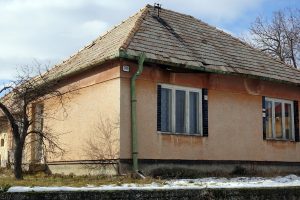
In the front of the new house, there were 2 big bedrooms and a corridor. At the end of the corridor there was a room which was going to be the storage room. There was also a glazed corridor from which you could go to the kitchen and one another bedroom. Stephen moved the three men into the future storage room. It was very narrow and long as they used to be, 1 and half metres × 2 metres. Stephen would supply food for the three men and they used a bucket as a toilet. They also had ‘strožochy’, which were mattresses filled with hay. In the past, they were used in beds. Mr Sťahel thought that somebody might come to the house, so he locked the storage room just in case. The men were hidden behind the locked door.
Anna Sťahel
Anna took care of 10 people for a few months. Her husband, three children, parents and including her it was 7 people. And on the top of that were the three men they were hiding. She was cooking for 10 people, washing their clothes and tidying up …
Anna would bring the food for the persecuted men in big milk jars with a cover. Milk from the cow, homemade cheese and homemade butter. Every evening she would return to the building site, so she could clean everything. Very often she would have tears in her eyes as she was leaving the men in the house. She was so sorry when she saw them everyday. She used to say:” What kind of a world do we live in, if for no reason this is happening? They did not hurt anyone, didn’t do anything, they just persecuted them for their beliefs.!”
German soldiers
German soldiers came into the village and on a regular basis they would do a house raid. They would just appear anywhere. They would also go to the new house with Mr Sťahel. They would look through every corner of the house and then eventually they would come to the locked storage door. The German soldiers would ask Mr Sťahel what is he hiding behind the door? He would say that these times are really difficult and people do steal, so he locked all his tools for the building of the house in that small room. The soldiers were happy with the answer and walked out of the house. One of them started shooting the birds.
The men behind the locked door did not know what was happening outside. They could only hear shooting. When the German soldiers left and Mr Sťahel opened the door, he saw the terrifying look on the faces of the men locked behind the door. They were very nervous and very pale. Mr Budi was shaking.
” Can you imagine how all these men felt in that storage room?” said Mrs Kollárova. Mr Lövinger remembered, that he thought that they had killed Mr Sťahel. In the same time, Mr Sťahel realized, that if the Germans would return to the house again and find the room locked again, and he tells them about locking the door so the tools will not be stolen, it could be more risky…
So he had to think again about what to do so that he could save these three men.
Cellar
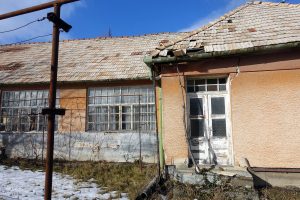 The house had a cellar. The cellar was built partially under the new house, and you could enter it from outside. The entry was from a concrete part of the pathway, which was covered with some shutters. You could open the shutters and there were stairs into the cellar. In the cellar there was a window through which you could see into the house corridor.
The house had a cellar. The cellar was built partially under the new house, and you could enter it from outside. The entry was from a concrete part of the pathway, which was covered with some shutters. You could open the shutters and there were stairs into the cellar. In the cellar there was a window through which you could see into the house corridor.
It was a good hiding place for the three young men. They would close the shutters and Mr Sťahel would cover it with a blanket or small carpet and put some wooden slabs in front of the window so nobody could see it. The three men still had enough air in the cellar and nobody had any idea that they were there. Mr Sťahel made sure that nobody found out that they were in the house.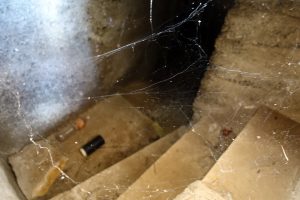
Lövingers a Sťahels
Mr Lövinger lived in Nitra during the war, and looked after his oldest nephew, the son of his sister, who along with her husband and two younger sons was deported to a concentration camp. Mr Lövinger, Budi Roth and Mr Šimkovic wanted to save their lives, therefore they ran away from Nitra. They hid in Cabaj-Čapore. They were very lucky to knock on the door of the Sťahel family.
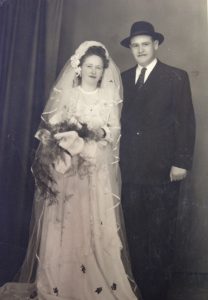 After the war, Mr Lövinger met his wife Gizka, who was 25 years old and wanted to get married, she was looking for a godly man. Their mutual friend introduced them to each other at a football match. After the wedding, Henry Lövinger introduced his wife to the Sťahel family. They had 2 children, a daughter Hanka and a son Milan. Mrs Gizka Altmann remembers that they became good friends with the Sťahel family, and if somebody was getting married they always met together and gave each other gifts. Mrs Sťahel always baked a birthday cake for Mrs Lövinger on her birthday. She baked amazing cakes. The Sťahel family was also remembered by her daughter Chaya (Hanka), who now lives in Jerusalem. Every time when the Sťahel family came to visit Nitra, they brought fruits which we as a children always enjoyed. ” we felt like we are family, because we were family.” said Mrs Hanka.
After the war, Mr Lövinger met his wife Gizka, who was 25 years old and wanted to get married, she was looking for a godly man. Their mutual friend introduced them to each other at a football match. After the wedding, Henry Lövinger introduced his wife to the Sťahel family. They had 2 children, a daughter Hanka and a son Milan. Mrs Gizka Altmann remembers that they became good friends with the Sťahel family, and if somebody was getting married they always met together and gave each other gifts. Mrs Sťahel always baked a birthday cake for Mrs Lövinger on her birthday. She baked amazing cakes. The Sťahel family was also remembered by her daughter Chaya (Hanka), who now lives in Jerusalem. Every time when the Sťahel family came to visit Nitra, they brought fruits which we as a children always enjoyed. ” we felt like we are family, because we were family.” said Mrs Hanka.
Emmigration
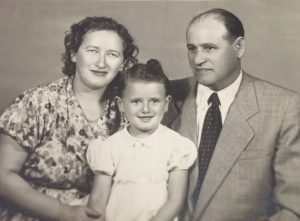 In 1965 the Lövinger family emigrated to Austria and from there to America. They lived in Cleveland, from where they were writing letters. They always wrote letters and in them stated, ” it is written in the Bible: the one who saved one human life, it is like he saved the whole world. You saved three lives, and all your family is recorded in the book of eternal life with the righteous of this world.“
In 1965 the Lövinger family emigrated to Austria and from there to America. They lived in Cleveland, from where they were writing letters. They always wrote letters and in them stated, ” it is written in the Bible: the one who saved one human life, it is like he saved the whole world. You saved three lives, and all your family is recorded in the book of eternal life with the righteous of this world.“
1988
Mrs Sťahel and the Lövinger family saw each other in the 80s. Probably in 1988, when the Lövinger family where in the spa town Piešťany for a retreat. Mrs Eva Kollár came to that meeting. They remembered and talked about everything and Mr Lövinger was very interested in what happened to Mrs Anna Sťahel.
Mrs Kollár remembers, that he sat her mother on his knees and told her daughter: ” you know Evička, this is also my mother not only your’s. My mother gave me life, but yours saved it. And these are moments we cannot forget.”
” He felt that this was his second mum. His mum gave him life, and Mrs Sťahel saved his life.” said Chaya Lewis.
Connections after the years
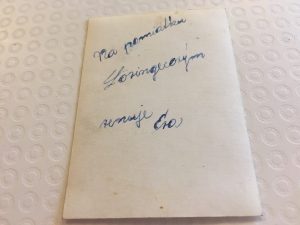 For some time they did not have any contact. One day Mrs Kollár was sitting in her sitting room with her children and talking about the Lövinger family, it was around 2015. That’s when her son decided that he was going to find them. On the internet he found condolences information where it was written: ” In memory of my husband Henry Lövinger”… He found the address of the son of Henry Lövinger, Mark Lövinger, who is a psychiatrist and has his own clinic. He wrote to him in English and Mark answered back and copied in to the email his mum Janka in Israel. That’s how Eva Kollár, the daughter of the Sťahels, found out that when he was 93 years old Mr Lövinger had passed away, Hanka ( now by name Chaya Lewis), then took her mum to live with her in Jerusalem.
For some time they did not have any contact. One day Mrs Kollár was sitting in her sitting room with her children and talking about the Lövinger family, it was around 2015. That’s when her son decided that he was going to find them. On the internet he found condolences information where it was written: ” In memory of my husband Henry Lövinger”… He found the address of the son of Henry Lövinger, Mark Lövinger, who is a psychiatrist and has his own clinic. He wrote to him in English and Mark answered back and copied in to the email his mum Janka in Israel. That’s how Eva Kollár, the daughter of the Sťahels, found out that when he was 93 years old Mr Lövinger had passed away, Hanka ( now by name Chaya Lewis), then took her mum to live with her in Jerusalem.
For some years, Mrs Kollár and Gizka Lövinger phoned each other. They phoned all the time. They asked questions and were interested in each other. Even today Hanka keeps saying how grateful they are to all of the Sťahel family. Mr Lövinger had never forgoten the war times.
“Until the end of his life he was asking difficult questions about how people could be so cruel. Only a few people were truly human. He always spoke with love about the Sťahel family, how they took care of Jewish men unconditionally and hid them in a small storage room, how Mr Sťahel would bring the food in big bags, how Mrs Sťahel would come every evening and clean the bucket they used for the toilet.”
Mrs Eva Kollár
Mrs Kollár telling the story about her parents and grandparents while she is summarizing: ” I will tell you, to have 3 children and to get into a situation like that, I don’t know how I would react… I really cannot say that I would do the same.” She is very proud of her parents and impressed by their bravery.
” People like that don’t get born very often in this world. They have a heart of gold.” remembers Mrs Gizella Lövinger, repeating the words of her husband.
(c)Dagmar Mozolová
Translation: Lenka and John Knight.

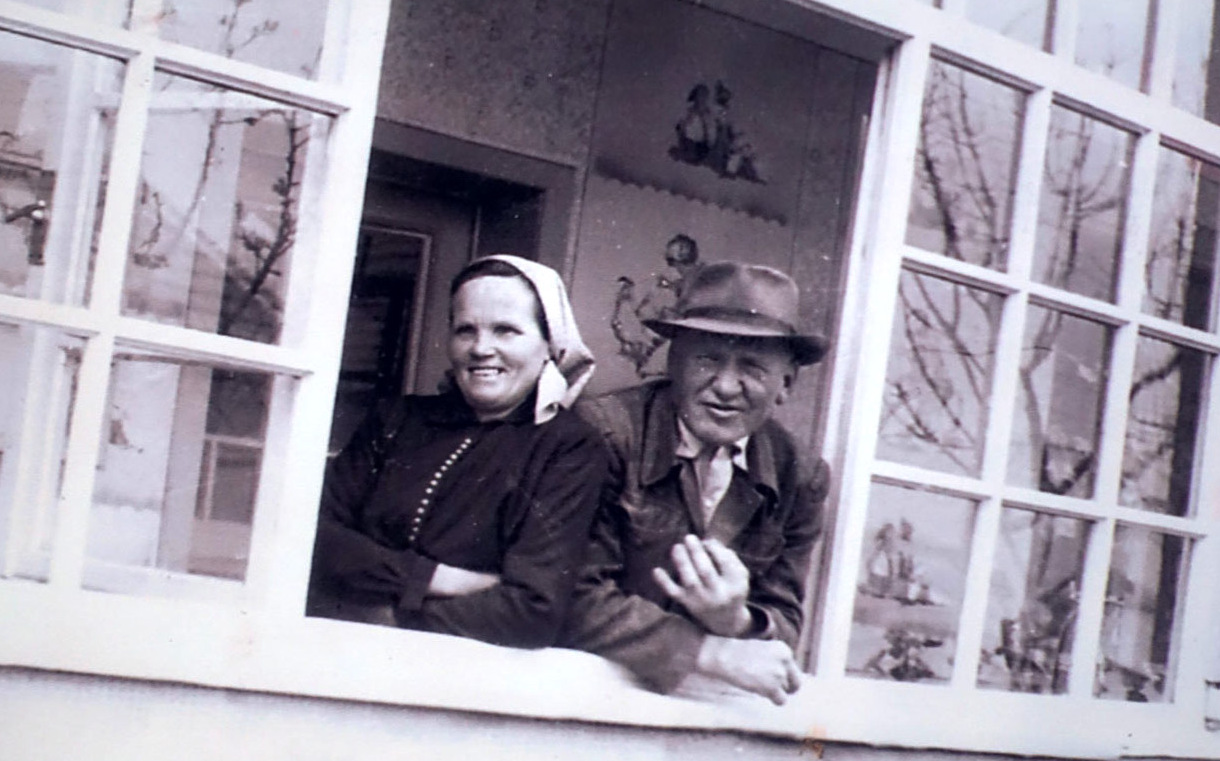
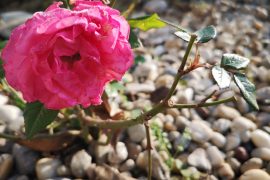
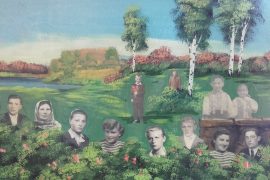
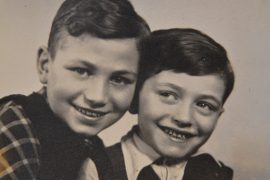
Comments are closed.